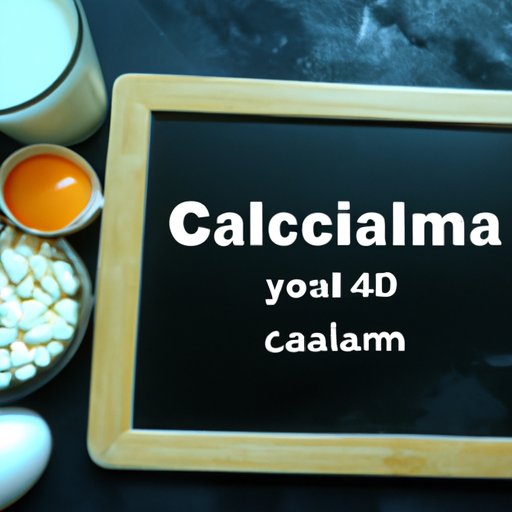
Introduction
Calcium is a vital mineral that plays a crucial role in building and maintaining strong bones and teeth. As one of the most abundant minerals in our bodies, it’s essential to have a sufficient amount of calcium in our diets. However, just like anything in life, there’s such a thing as too much of a good thing. In this article, we’ll explore whether you can take too much calcium, the risks and potential health consequences of consuming too much, and how you can maintain an appropriate calcium intake through proper balance and moderation in your diet.

The importance of calcium in our bodies and the recommended daily intake
Calcium is an essential mineral that helps build and maintain strong bones and teeth. It also plays a vital role in muscle function, nerve transmission, and hormone secretion. The recommended daily intake of calcium varies depending on age and gender. Adults from 19-50 years old should aim for 1000mg per day, while those above 51 should aim for 1200mg per day. Infants, children, and teenagers also require varying amounts of calcium, depending on their age.
The potential risks of consuming too much calcium
While calcium is essential for our bodies, having too much can have adverse effects on our health. Consuming an excess amount of calcium can lead to kidney stones and gastrointestinal issues, such as bloating, constipation, and abdominal pain. It can also interfere with the absorption of other essential nutrients, such as magnesium, iron, and zinc. It’s essential to maintain a balance between calcium intake and absorption to avoid these potential health risks.
The difference between consuming calcium through natural foods versus supplements
An excellent way to meet your daily calcium requirements is by consuming natural sources of the mineral with your meals. Some of the best sources include dairy products like milk, cheese, and yogurt, leafy greens, and grains. However, supplements can also provide additional calcium, especially for individuals who can’t get enough from their regular diet. But while supplements can be helpful, consuming too much can increase your risk of adverse health effects such as calcium deposits in the arteries and kidneys.
The effect of excessive calcium intake on other nutrients in our bodies, such as vitamin D and magnesium
Consuming an excess amount of calcium can have a negative impact on other essential nutrients in our bodies. Taking too much calcium can lead to magnesium and vitamin D deficiencies, both of which are critical for strong bones and overall health. Vitamin D is necessary for calcium absorption, while magnesium is essential for maintaining healthy bones and muscles. When there’s an imbalance between these nutrients, it can lead to potential health problems, such as osteoporosis.
The populations at higher risk for calcium overdose
Some individuals are at a higher risk for excessive calcium intake than others. Those with hyperparathyroidism, overactive thyroids, and kidney problems are at an increased risk of consuming too much calcium. It’s essential to speak to a healthcare professional to determine the appropriate amount of calcium to consume based on an individual’s unique health status and dietary needs.
Signs and symptoms of calcium toxicity to watch out for
Too much calcium in the body can lead to physical symptoms such as nausea, vomiting, thirst, muscle weakness, and abnormal heart rhythms. It’s important to understand that the symptoms of calcium toxicity can be similar to many other health issues. If you experience any of these symptoms or other health concerns, consult with your healthcare professional to determine the root cause.
How to maintain a safe and appropriate calcium intake through moderation and balance in your diet
To maintain a healthy balance of calcium in your diet, it’s essential to consume natural sources of the mineral and take supplements only if necessary and under the guidance of a healthcare professional. Eating a healthy, well-balanced diet rich in calcium and other essential nutrients, such as magnesium and vitamin D, is crucial for overall health and can help prevent potential health concerns associated with excessive calcium intake.
Conclusion
Calcium is a necessary mineral for our bodies, but consuming too much can lead to adverse health effects, such as kidney stones and gastrointestinal issues. It’s essential to maintain a balance between calcium intake and absorption through proper diet and if necessary, under the guidance of a healthcare professional. By consuming a healthy, balanced diet and monitoring calcium intake, we can maintain healthy bones and overall wellness.





